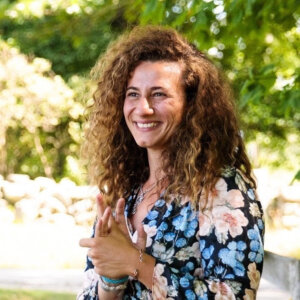At every level, Jews must push investors to leave behind fossil fuels
With Sen. Manchin blocking federal climate legislation, communities must come together to confront the crisis

Steam and exhaust rise from different companies on a cold winter day in 2017 in Oberhausen, Germany. Photo by Lukas Schulze/Getty Images
Not everything has a simple explanation, but every cause has an effect. If you throw a stone into a pond, it will splash. If you pump carbon into the air, it will change the atmosphere. If you give a senator a coal company, he won’t vote for federal legislation to confront climate change.
Although Sen. Joe Manchin’s abrupt dismissal of our party’s signature climate legislation last week after months of negotiations was shocking, it wasn’t surprising. It was entirely in keeping with decades of his actions as an elected representative, protecting his own political position and his family’s waste coal business. Even though we are facing deadly record heat waves in North America, Britain, and elsewhere in Europe, businesses and politicians pretend that climate change is somehow tomorrow’s problem.
That’s simply not true. Our collective behavior over the past 30 years has caused the effects we are seeing today, and they are already egregious. This week, Britain experienced the highest temperature ever recorded there (104.4 degrees Fahrenheit) as Europe staggers under a devastating heat wave. You may already have forgotten the beginning of the summer where crops and families died in the extreme heat of the Indian subcontinent. The climate crisis not only claim lives, but is also wildly expensive: in 2021 alone it resulted in $145 billion of damage here in the U.S., up from $91 billion the year before.
Cause and effect.
So we Americans need to champion our own cause to effectively counter climate change. If we continue to extract and burn, the human and financial costs will increase exponentially. To prevent this, we need to rapidly change the incentives of a financial system that continues to pay fossil fuel companies today to hurt vulnerable communities tomorrow — and all of us next year.
We need to act at the level of community to combat climate change. That’s as true for rural communities as it is for college communities as it is for America’s Jewish communities. That’s why, with other students at Harvard in 2012, I founded Divest Harvard and we successfully moved the university’s $41.9 billion endowment away from fossil fuels. It’s why in 2018, as a Maine state senator, I sponsored the passage of the bipartisan Green New Deal for Maine that will begin to make our state sustainable. It’s why this year I’m proud to be associated with All Our Might, the new campaign from Dayenu: A Jewish Call to Climate Action.
Since the Paris Agreement was signed in 2015, the world’s top 60 global banks have invested $3.8 trillion into fossil fuels. But, unlike fossil fuel companies, investors can be forces for good and drivers of a clean energy economy — All Our Might is an audacious attempt to mobilize the American Jewish community to urge them to invest in a just and livable future.
Just as shifting Harvard’s billions will save more lives than recycling college plastic, All Our Might will save lives by urging American Jews — and the institutions they support — to think about how to apply their “might.” It’s not about helping synagogues recycle; it’s about synagogue members helping to reform a deadly aspect of the global financial system and keep fossil fuels in the ground. We believe that our community should make good on its promise to live l’dor v’dor — from generation to generation — and turn away from any investments that destroy the future.
Over Passover, scores of Dayenu Circles around the country joined faith partners and the broader climate movement, pressuring major banks and investors to leave fossil fuels behind. As we move to the summer fearing now-endemic seasonal extreme weather, we are protesting at annual shareholder meetings of major financial institutions, calling these managers to account for the funds — greater than the wealth of most sovereign countries — that are being plowed into fossil fuel companies.
It took a decade to align Harvard’s endowment with climate justice before, finally, last fall the university committed to divestment. We don’t have another 10 years to convince these major financial institutions to change direction. Many of them already say that they are committed to effecting change and we need to hold them to their word.
The daily Jewish Shema prayer exhorts us to love God with all our heart, all our soul and all our might. Over the past year, we have brought heart and soul to confront the climate crisis: making thousands of calls to policymakers, paying office visits, sounding shofars in the streets, and standing shoulder to shoulder with communities on the front lines of the climate crisis.
Our representatives need to be free from financial incentives to keep poisoning us. For us to have the effect we need — of surviving and thriving — we need to support the mass divestment that can end the era of fossil fuels.
Jewish Americans must come together to create a new energy future that starts here, but helps the world: from Maine farmers suffering drought to native Louisianans whose homeland is under water; from Coloradans whose homes burned last year to Harvard stakeholders who helped move the endowment; and from the broader faith community fighting for climate justice to the specific American Jewish community.
We need to bring all our might to free ourselves from the fossil fuels that are driving this political and climate crisis.
To contact the author, email [email protected].
















